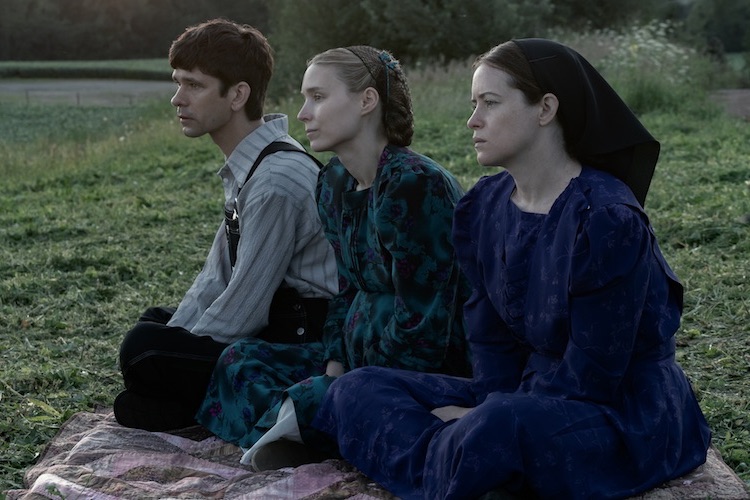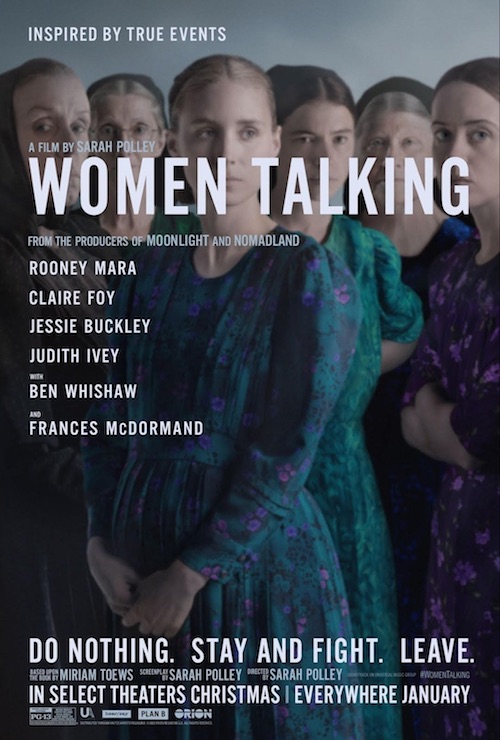
Movie Review: Women Talking
What We Liked
What We Didn't Like
“ I do not permit a woman to teach or to assume authority over a man; she must be quiet.”
– 1 Timothy 2:12
Numerous explanations have been given for the Apostle Paul’s harsh teaching. Some scholars feel he was responding to cultural concerns in a patriarchal society. Others believe he was addressing a conflict inside local churches. It’s also possible he was simply a raging misogynist. Whatever his intentions, it’s undeniable that this verse and interpretations of it have caused irreparable harm and devastation, creating cultures where women are seen as unequal to men and excusing horrendous abuse.
It’s a verse that the characters of Women Talking would know quite well, although they’ve never read it with their own eyes. Raised in a strict Mennonite community, they’re not permitted to read or write, and they have no voice in governing their small village. Although Paul’s verse is never quoted in Women Talking, the film often feels like a response to that passage and the continuing harm it causes.
An adaptation of Miriam Toews’ novel, Women Talking opens as the women have experienced long periods of sexual violence. A group of them meet together in a barn to discuss their response – do they stay and forgive their attackers, as they’ve been commanded, and have done all their lives; do they fight back; or do they leave? The remainder of the film observes their discussion, which also serves as a communal awakening and act of theological deconstruction.
This is the fourth film from director Sarah Polley, and it’s her fourth masterpiece. Since her directorial debut with 2006’s Away From Her, Polley has developed a vibrant and diverse filmography. Her films span many styles and tones, from the deep emotions, light comedy and bright colors of Take This Waltz (2012) to the sharp twists, turns and reveals that made Stories We Tell (2013) one of its decade’s best documentaries. Polley doesn’t have a locked-down visual style, but she definitely has distinct thematic interests. Few are better at making films that examine how we process our ever-changing emotions and reassess our relationships with family, community and culture.
Women Talking often feels like a play, with long scenes of the women standing around the barn, talking to and at each other. Some of the women hold fast to their convictions that they must forgive and remain in the colony; to leave would be the same as being kicked out of God’s kingdom. Others want to fight back against their aggressors, protect their families and be given an equal say in the colony; still others feel that moving on and trusting God to lead them to a new life is their best option. Aside from a few brief interludes and intercut scenes, Polley allows the camera to sit back and watch the conversation, captured in desaturated, melancholic tones.
Some may find it stagey, but Polley’s approach is important; more than just focusing on a conversation, she captures – starting with a debate about use of the word “leave” rather than “flee” – the sense of discovery that these meetings create. For many of these women, putting their experiences or anger into words is the first time they’ve realized the depth of physical, sexual, and spiritual abuse they’ve suffered. Polley often cuts to quick, shocking moments of the women discovering the abuse inflicted on them in their sleep; it’s notable that in the majority of these shots, the women suffer alone. Discussing their pain communally not only creates solidarity and support, but it also provides the foundation with which they can begin to comprehend escape, hope and new beginnings.
These secret barn meetings allow the women, for the first time, to imagine their possibilities, their future and their real worth. The men have taken away their dignity and identity – “they make us disbelieve ourselves” – one woman says; together, they are able to recognize each other’s humanity, dignity, and strength. While they don’t have the ability to read or write, speaking openly about their experiences allows them to begin to understand that they are more than just possessions who are expected to be quiet and submissive. Voicing their hurt allows them to better understand what they’re entitled to. Talking about the ways their religion has been perverted provides an opportunity for them to imagine what it might mean to build upon that faith, purge it of the harm it’s caused, and reclaim its message of beauty and hope.

Ben Whishaw, Rooney Mara, and Claire Foy star in “Women Talking.” Credit: Michael Gibson. Copyright: © 2022 Orion Releasing LLC. All Rights Reserved.
With its bleak subject matter and dialogue-heavy scenes, it’s easy to imagine Women Talking as a bitter pill and a bit of a slog. But it’s far from that. The sense of energy and excitement that come from watching the women begin to understand the importance of their dialogues is palpable, and it’s brought to life by a cast of some of the best working actors, who bring the requisite anger and anguish, but also tenderness, energy and even joy. Claire Foy is particularly strong as a character who brims over with anger, vibrating with rage at every moment, and Jessie Buckley is heartbreaking as a woman who is also angry, but also just barely masking deeply felt fear. Rooney Mara gives perhaps the best performance of her career as Ona, a single mother who seems to radiate with joy every time she imagines stepping out on her own; Mara has a strong, tender chemistry with Ben Wishaw, who, in the film’s lone male speaking role, embodies meekness and compassion. Even actors in minor roles bring texture and character; Sheila McCarthy draws both laughs and tears as one of the older women, who regrets her complicity in failing to stop the abuse, but also is eager to bring change. And Frances McDormand only gets a few moments of screen time as one of the colony’s sterner residents, but her presence alone tells you all you need to know about the character and the power. It’s the best ensemble of the year, notable in that while Foy, Buckley, and Mara have the most screen time, no one stands out as the lead. Every actor supports the other; every character has their moment to contribute to the conversation.
The strength of the cast might seem to make Polley a passive observer, but she’s not. Her script is intelligent and imaginative, and she is in love with capturing faces; in several sequences, she holds tight on an actor’s face and gives them the time to radiate with joy or collapse in tears. Her decision to eschew theatricality or a “cinematic” approach to the barn meetings is in itself an important choice; it allows the conversation to remain front and center, without any flourishes to distract. But there are moments where she captures life in the colony with an almost Malickian calm and beauty, and she’s canny about how she delivers contextual information without putting too fine a point on it; her reveal of when the movie is set, for instance, is very matter-of-fact, but deployed in such a way that it still feels like a revelation.
Women Talking is a film of quiet power and beauty, capturing the hope that is possible when we are allowed to find our voices. It’s a testament to the power of community, a showcase for a highly talented ensemble, and another reminder that Polley is among the best directors currently working. It’s one of the year’s best films.



